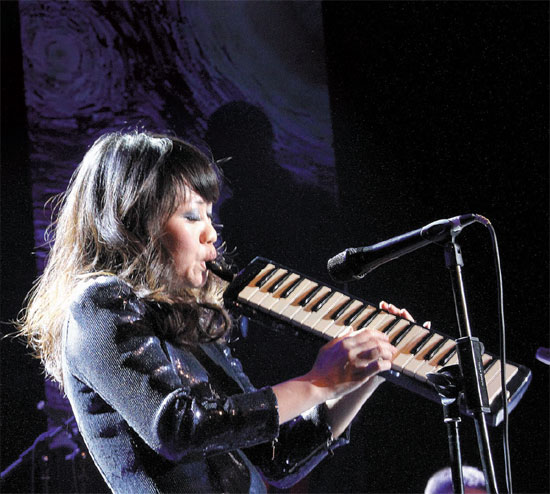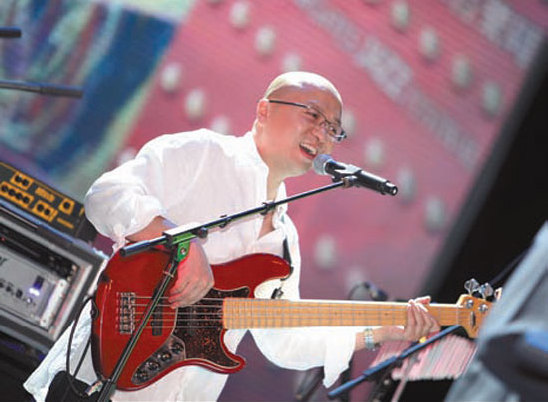Jazzing up Beijing
Updated: 2013-12-18 07:07
By Lucy Cheung (China Daily USA)
|
||||||||
Huang Yong says he used to cringe at the music of Miles Davis, but now the bassist is the capital's big champion of the genre. Lucy Cheung speaks to the founder of the Nine Gates Jazz Festival.
When Huang Yong was a young man studying bass, jazz music held little appeal. "When I was 20 years old, I couldn't bear listening to Miles Davis for 10minutes," says the founder of the Nine Gates Jazz Festival. "But when I started to explore jazz music on my bass, to read and understand its structure and its unique language by practicing pieces from Miles' album Kind of Blue, for example, I found that jazz was gradually sinking deep into my heart and soul, and it requires me to push my limits constantly." Since transforming from reluctant listener to true believer, Huang now heads the Nine Gates Jazz Festival, regarded as the only major jazz festival in the northern region of China. The annual event, now in its eighth year, kicks off on Dec 19 and will feature established jazz musicians from Beijing, Shanghai, Kunming and the United States, performing in different venues across the capital.
A highlight will be a concert featuring composer and pianist Xia Jia, guitarist and bassist Liu Yue and 13-year-old jazz piano prodigy Dai Liang (stage name Abu) at the Guo Yin Tang music hall of the Chinese Conservatory of Music. The China Jazz Association will also be officially launched during the festival.
|
Nine Gates Jazz Festival has developed into one of the major platforms for local musicians like singer Zhang Ying to display their talent. Photos provided to China Daily |
Unlike a lot of international star-studded jazz festivals in China, Nine Gates focuses on promoting local talent.
"Before Nine Gates, Udo Hoffmann, the German curator, started the first jazz festival in Beijing back in 1993," Huang says. "I loved those years, getting on stage with international big names. The atmosphere was truly festive. But when I had the idea of starting my own festival, I thought importing jazz is not enough. The only way to truly develop the local jazz scene is to help create a plat form for local musicians to have their voices heard." 
His dedication to developing the jazz scene in Beijing saw Huang form his own company and fund the first Nine Gates festival with his income as a bassist.
"Beijing was known as the only city in ancient China that had nine gates. Naming the festival 'Nine Gates' is a tribute to Beijing city," Huang says.
Huang's ambition is to popularize jazz, but serious jazz is a long way from the mainstream music scene in any country, thanks to its challenging, improvisational nature.
The concept of jazz first came to widespread attention in China when the tune Going Home by American pop saxophonist Kenny G became popular about 15 years ago. When Japanese-Brazilian bossa nova musician Lisa Ono hit the scene about 10 years ago, her voice and guitar could be heard in every cafe in China. The originality of Antonio Carlos Jobim was then labeled as the definition of "jazz" by media and concert operators in China. Jazz, coffee and the bourgeoisie lifestyle are linked in the mindset of many Chinese.
In recent years, a more diverse range of jazz musicians have started to make their way to China. Since 2006, the NOTCH festival, which celebrates the art and culture of Northern Europe, has been bringing Scandinavian musicians to Beijing and Guangzhou. The region is known as the cradle of new European jazz.
Bugge Wesseltoft, a Norwegian electronic jazzman, visited Beijing for the first time in 2000, and his subsequent visits and performances in China led him to produce an album for Hong Kong pop singer KarenMok.
The local jazz scene in Beijing is steeped in the Western tradition. One of the best established Beijing jazz pianists, Xia Jia, cited the influence of minimalism pioneer Steve Reich on his own composition, when he performed at the Nine Gates Jazz Festival in 2007.
Italian pianist Moreno Donadel, who once played with the master saxophonist Lee Konitz, has played in a jazz trio in Beijing for 10 years. He feels China lacks "teachers of jazz music".
Composer and guitarist Liu Yue has written and published a book called The Improvisational Road of Jazz Guitar, a rare educational resource for jazz guitar learners written and edited by a local musician. Liu says jazz can be a generalized concept, which includes elements such as rock, Latin, pop and folk music. He says jazz can enrich all forms of music and deepen musicians' understanding of the world.
Huang says that in 2004,when he was playing with almost every jazz group in Beijing, he suddenly realized that instead of playing standard jazz, his peers, such as saxophonist Liu Yuan, composer and pianist Kong Hongwei and Xia Jia, and Liu Yue had started to compose their own work.
"There are people who would drive two hours to try out a restaurant because of their curiosity and desire for good food, while others would try to learn and understand how to cook a tasty dish, which is two different perspectives: One is more for the senses, the other is more for the soul, "Huang says.
Nine Gates selects its acts based on Huang's vision: The festival aims to be educational rather than putting on purely commercial concerts. When deciding on the program, Huang makes sure all the invited international musicians are willing to give a free class at the jazz department of a music school in Beijing and to participate in a jam session with Chinese musicians at a local jazz bar.
One of the highlights of the opening concert at this year's festival will be a jam session between Jaleel Shaw, a New York saxophonist, and young Chinese saxophonist Li Gaoyang.
|
Huang Yong, founder of the annual jazz festival. |

 Snow storm wallops NE USA
Snow storm wallops NE USA Russia to bail out Ukraine for $15 billion
Russia to bail out Ukraine for $15 billion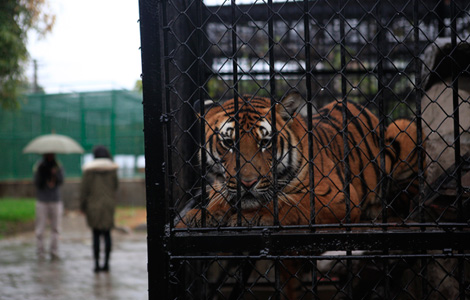
 Fatal tiger attack 'points to flaws in zoo management'
Fatal tiger attack 'points to flaws in zoo management'
 Merkel sworn in as chancellor for a third term
Merkel sworn in as chancellor for a third term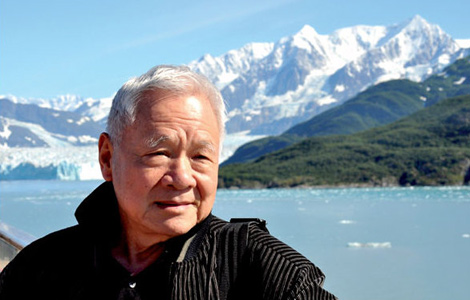
 Life in poetry
Life in poetry
 US first lady visits children in medical center
US first lady visits children in medical center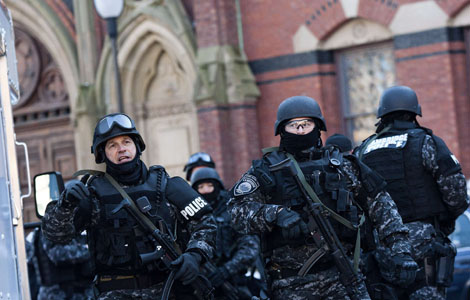
 Harvard reopens after bomb scare
Harvard reopens after bomb scare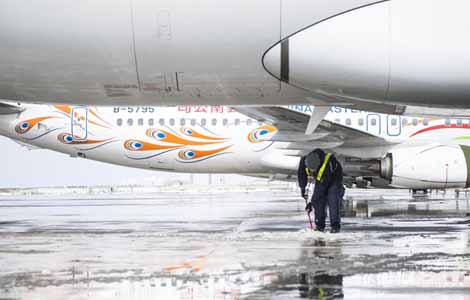
 Snowstorms cause chaos for travelers in Yunnan
Snowstorms cause chaos for travelers in Yunnan
Most Viewed
Editor's Picks

|

|

|

|

|

|
Today's Top News
Warship encounter handled effectively
Obama rated low on domestic issues
Vast deposits of 'flammable ice' found
Russia to bail out Ukraine for $15 billion
System for organ donors test
Luxury market cooling down
Court to issue guide on private loan cases
China, US urged to lead climate change fight
US Weekly

|

|
